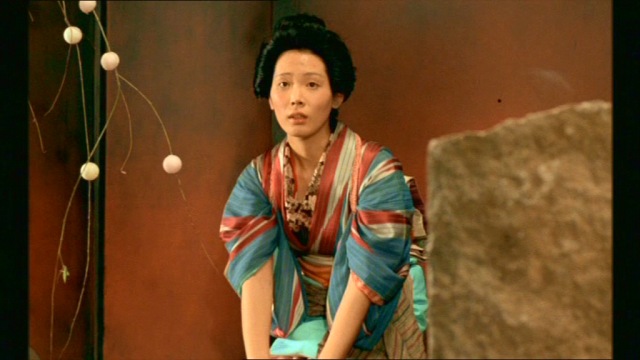

At the given hour, she would descend a flight of stairs, walk across the room, and exit. After serving a prison sentence, she was hired by a Tokyo tavern to appear nightly. "In the Realm of the Senses" was based on a true story of a woman who castrated her lover at his request. I am reminded of a story told by Donald Richie, the great writer on Japanese themes.

If he were a more active, complex character, that would generate a wider range of issues, and he works better within the plot as a catalyst. I am not even sure it was a mistake to have Sozaburo be so passive.
#In the realm of the senses movie review code#
There is a kind of understated humor in the way the senior samurai officers discuss their troublesome young recruit, and melancholy in the way the samurais follow their code as they are ceasing to be relevant or useful. "Taboo" is not an entirely successful film, but it isn't boring.
#In the realm of the senses movie review tv#
Oshima in recent years has become a Japanese TV star, and this film was a surprise to those who assumed he had more or less retired from filmmaking. So great was the crush to attend that film's Cannes premiere that one critic was shoved through a plate glass window, luckily escaping the hero's fate.

Nagisa Oshima, born in 1932, was a rebel of the Japanese cinema in the 1960s and '70s, and is most famous for "In the Realm of the Senses" (1976), the story of a love affair that turns into a sadomasochistic obsession, in which, during one sex scene, the hero loses that implement he might most require if he hoped to have another one. It's as if the young samurai is a platonic ideal of androgynous perfection, and the movie is not about him but about his effect on the others. Oshima, directing his first film in 14 years, has found an actor with the physical attributes to play the character and seems content to leave it at that his camera regards Sozaburo as an object of beauty but hardly seems to engage him. Is this a weakness of the film? Maybe so.

The thing about Sozaburo, indeed, is that he hardly blinks at anything: Even while another samurai is having sex with him, he hardly seems to notice. Is Sozaburo capable of fighting well enough to carry his weight in the samurai army? He turns out be the best of the young swordsmen, and when a superior orders him to carry out the execution of a disobedient samurai, he beheads the offender without a blink. A samurai clearly in love with Sozaburo is Tashiro ( Tadanobu Asano), a brawny type who feels competitive because both men were recruited at the same time. Hijikata is not gay, but Sozaburo is beautiful enough to inspire a lonely man to relax his usual standards. As director and star, he is known for violent macho thrillers, and so his casting here is provocative imagine John Wayne in " Red River," with a stirring beneath his chaps every time he looks at Montgomery Clift. When Beat Takeshi directs, it is under his real name of Takeshi Kitano. Hijikata ( Beat Takeshi) that hints of hidden agendas. It is strange that a candidate as effeminate as Sozaburo would be one of two finalists chosen after sword-fighting auditions, but then again there is a look in the eye of Capt. Threatened by new kinds of fighting, new channels of power and the opening of the country to the West, the men of the Shinsen-gumi troop adhere all the more rigidly to the samurai code, even enforcing death as a punishment for severe violations. The movie takes place in Kyoto around 1865, in the last days of traditional samurai.


 0 kommentar(er)
0 kommentar(er)
